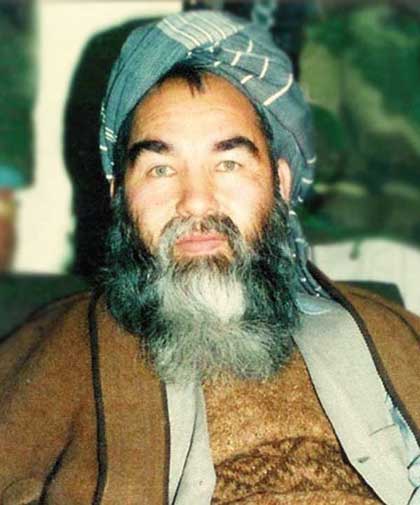Before anything I would like to express my deepest condolences to the family of Baba Mazari and to the families of all those noble men who fought and made the ultimate sacrifice to ensure the existence and rights of their fellow beings. Let me also thank the family of Baba Mazari all those mothers, fathers, wives, daughters, sons, sisters and brothers who lost their loved ones. I assure you no one can doubt that our current socio-political status in Afghanistan and abroad are the direct result of your surfaces. Without men like Shafe, Naseer, Abozar, Qambar, Nasir Sia and all those other soldiers the Hazaras would have still been living and classed as what we were before 1990s. In the next paragraphs I like to write a few lines about the great Baba Mazari, who for the first time united almost every Hazara on a single political platform, despite the political and ideological differences. For the first time in our history we are represented as a single unit and are recognized as a political force in Afghanistan. These were only achieved under the leadership of Baba Mazari and for that we all have enormous amount of respect in our heart for him. The great Baba Mazari was captured and killed on the 13th of March 1993. His departure devastated many people in different parts of the world. On the 13th of March 1993 we lost a leader, a father, a hero and saviour, who for the first time in the history of the Hazaras equalized us with the fellow Afghans, and gave the courage and self confidence to stand up and fight for what’s ours.
Leadership:
Baba Mazari set the leadership standard amongst the Hazaras very high. When it comes to leadership we always compare and expect every one of our contemporary leaders to Baba Mazari. That is clearly a bar too high to achieve. Baba Mazari for the Hazaras is what Gandhi was to British Indians, what Martin Luther King Jr. was to colored Americans and what Neilson Mandela was to South Africans. They were men with commitments, honesty, intuitions and charisma whom we don’t get a lot. Like in the case of the Indians, the colored Americans and the South Africans, we might not have the pleasure of having another Baba Mazari like leader in years to come. Therefore we must stand united behind the next best option we have and imply what Baba Mazari thought us.
Baba Mazari is probably the most charismatic Hazara leader. He had very distinctive leadership skills, who for the time managed to unite a much divided ethnic group, despite the workings of foreign and domestic hands against him. In the 1989 when he succeded in unifying nine different groups under the umbrella of Wahdat Islamic Party in Bamiyan, it was very rarely believed that the Hazaras would one day become a significant political and military force in Afghanistan, but under the new name and leadership of Baba Mazari Wahdat further consolidated its political dominance. The Wahdat manifesto emphasized the continuation and intensification of efforts for the creation of an Islamic government based equality, social justice and brotherhood, which was the first demand of its kind at that time. Baba Mazari was the main agent of the explicit transformation of the party into a platform for the rights and political demands of the Hazaras, who had been ignored for centuries. When he arrived in Kabul in 1992, he further opened the door for the party to gain sbastantial recognition both locally and internationally. For the first time in the history of the Hazaras and Afghanistan a man had stood up and proudly claiming to be Hazara and fighting for the rights of his fellow-Hazaras, and he was being taken seriously. While Wahdat and Baba Mazari were making marks in Kabul, it was vividly clear that the Hazaras in Afghanistan and abroad were starting to rally behind him. He had convinced the Hazaras around the world that Wahdat under his leadership could change the dark history of the Hazaras in the years to come.
In the past many leaders stood up and fought against the systematic discriminations and oppressions. But what is unique about Baba Mazari’s resistance is the fact that for the first time, he convinced the large majority of the Hazaras that they could potentially resist and fight for their legitimate right of existence in Afghanistan and win. It’s this particular achievement that has made Baba Mazari a very distinctive leader. He absolutely devoted his life for the bettering lives of his fellow Hazaras in Afghanistan and abroad, and this can be seen in the numerous books and articles written about the Hazara by the Afghan and foreign scholars. His very famous demand “being a Hazara should no longer be a crime” has in many ways been achieved.
New approach:
Ideologically Baba Mazari was a political Islamist and a pragmatic Hazara nationalist. He fully understood the rules and requirements of contemporary politics in Afghanistan. He knew that idealism, and morality alone would not work in favour of the Hazaras at the time of his leadership. He consequently initiated a new approach or strategy which was by far has been the most effective approach or strategy in the history of the Hazaras.
Conclusion:
The Hazaras have again lost their political objectives they had gained during the Baba Mazari era. To regain what is lost, we need to revisit his philosophy. Baba Mazari without any doubt was the most civil and moral leader in the history of Afghanistan and particularly the Hazaras. He prised women rights, equality, justice, civility and every other democratic and modern norms and values. But when the interests of his people were not guaranteed by these, he had the ways to protest and resist and he definitely hoped to see an Afghanistan where everyone is equal regardless of his ethnicity and religion and that has been achieved to a certain extent.

